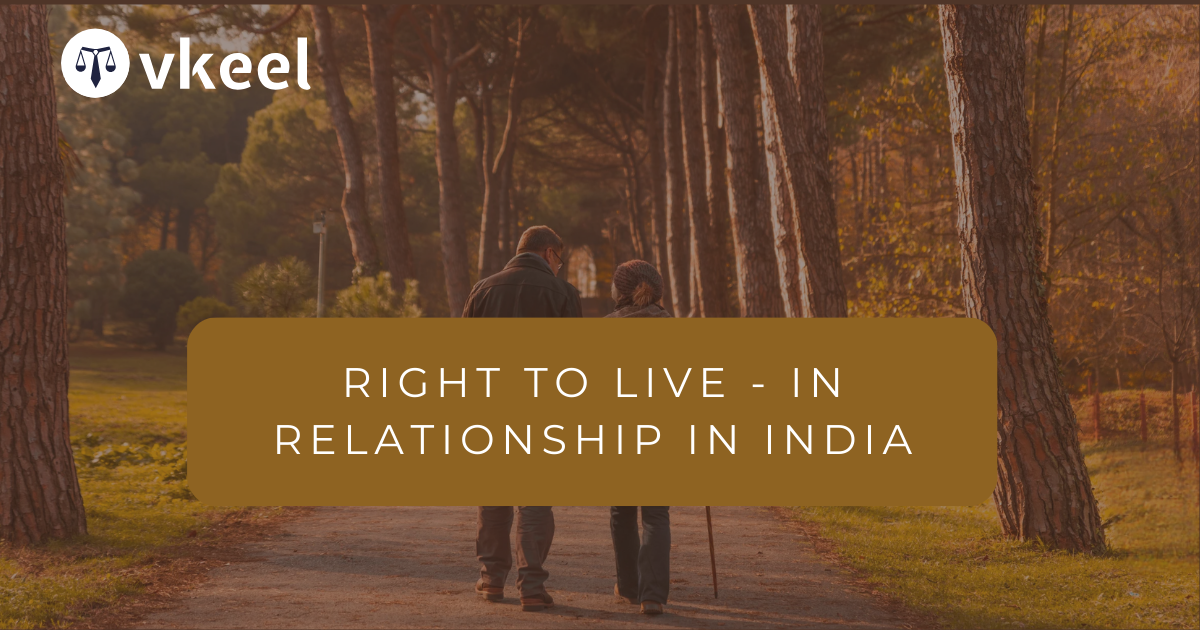Right to live in Relationship in India
By Himanshu Kumar
Table of Contents
Introduction
A live-in relationship, also known as cohabitation, refers to an arrangement where unmarried partners choose to live together in a domestic partnership without formalizing their union through marriage. In this type of relationship, couples share a living space, household responsibilities, and often finances, while maintaining a romantic or intimate connection. Live-in relationships have become increasingly common worldwide, reflecting changing societal norms, values, and attitudes towards marriage, relationships, and family structures.
In recent years, India has witnessed a gradual shift in societal attitudes towards relationships, with an increasing acceptance of non-traditional arrangements such as live-in relationships. While these partnerships offer individuals greater freedom and autonomy in their personal lives, they also raise important legal questions regarding rights and protections for partners involved.
Live-in relationships are based on the mutual consent and agreement of both partners to cohabit and share their lives together. Unlike marriage, which involves a formal legal contract and ceremony, live-in partnerships are characterized by an informal arrangement where couples choose to live together without the legal obligations and responsibilities associated with marriage.
One of the primary reasons individuals opt for live-in relationships is the freedom and autonomy it offers. Couples in live-in partnerships have the flexibility to define the terms of their relationship, make decisions about their living arrangements, and pursue their personal goals and aspirations without the constraints of societal expectations or legal obligations.
Live-in relationships provide an opportunity for couples to test their compatibility and assess their long-term compatibility before committing to marriage. By sharing living space, experiencing day-to-day routines, and navigating challenges together, partners can gain insights into each other’s personalities, habits, and values, helping them make informed decisions about their future together.
Legal Perspectives on Live in Relationships
The legal framework surrounding live-in relationships in India has evolved over time, reflecting changing societal norms and judicial interpretations. While live-in partnerships are not expressly recognized under Indian law, courts have increasingly acknowledged the rights and entitlements of partners in such relationships, drawing upon principles of equity, justice, and individual autonomy. Key legal perspectives on live-in relationships includes:
Right to Privacy and Personal Liberty
The Supreme Court of India has affirmed the right to privacy and personal liberty as fundamental rights under Article 21 of the Constitution. This includes the freedom to choose one’s partner and live together in a consensual relationship without interference from the state or society. The right to privacy provides a constitutional basis for individuals to enter into live-in relationships and conduct their personal lives according to their own preferences.
Doctrine of Economic Partnership
Courts have recognized the principle of economic partnership in live-in relationships, whereby partners contribute to household expenses, share financial responsibilities, and acquire joint assets during the course of their cohabitation. In cases of dispute or separation, courts may apply principles of equity and fairness to divide property and allocate financial support based on the contributions and needs of each partner.
Protection Against Domestic Violence
The Protection of Women from Domestic Violence Act, 2005 (PWDVA) provides legal protections for partners in live-in relationships, irrespective of their marital status. Under the PWDVA, individuals in domestic relationships, including live-in partners, have the right to seek protection orders, residence orders, and financial relief in cases of domestic violence or abuse. This legislation extends safeguards to partners in live-in relationships and acknowledges their vulnerability to domestic violence.
Child Custody and Maintenance
In cases involving children born out of live-in relationships, courts may consider the best interests of the child and ensure that both parents fulfill their responsibilities towards the child’s upbringing, maintenance, and welfare. While live-in partners do not have automatic rights to custody or maintenance under personal laws, courts may grant visitation rights, custody arrangements, and financial support based on the child’s welfare and the parties’ respective circumstances.
Landmark case studies on Live-in relationship
Several landmark cases have shaped the legal landscape surrounding live-in relationships in India, providing clarity on rights, entitlements, and protections for partners involved. These case studies illustrate the judicial approach to recognizing and safeguarding the interests of individuals in live-in partnerships:
Indra Sarma v. V.K.V. Sarma (2013)
In this case, the Supreme Court of India recognized the concept of “mental cruelty” in matrimonial disputes and held that persistent conduct causing significant anguish and distress could constitute grounds for divorce. The judgment underscored the importance of addressing psychological abuse within marital relationships and protecting individuals’ mental well-being.
D. Velusamy v. D. Patchaiammal (2010)
In this landmark judgment, the Supreme Court laid down guidelines for determining the existence of a valid live-in relationship and the rights of partners involved. The court held that a live-in relationship must fulfill certain criteria, including cohabitation, mutual consent, and a shared household, to be considered as akin to marriage for the purpose of legal entitlements and protections.
Payal Sharma v. Superintendent, Nari Niketan (2001)
In this case, the Delhi High Court recognized the rights of partners in live-in relationships to live together without interference from family members or external authorities. The court upheld the principle of individual autonomy and personal liberty, affirming the right of consenting adults to choose their partners and live together in a manner of their choosing.
Recent Legislative and Developments
In response to evolving societal dynamics and judicial pronouncements, lawmakers have introduced legislative amendments and policy initiatives aimed at recognizing and regulating live-in relationships in India. These developments seek to provide clarity, certainty, and legal protections for partners involved in such arrangements. Key legislative amendments and developments include:
Protection of Women from Domestic Violence (Amendment) Act, 2019
The amendment to the PWDVA expanded the definition of “domestic relationship” to include partners in live-in relationships, thereby extending legal protections and remedies to individuals experiencing domestic violence or abuse in such partnerships. The amendment ensures that partners in live-in relationships have access to support services, protection orders, and redressal mechanisms under the PWDVA.
Drafting of Model Tenancy Act, 2021
The Model Tenancy Act, proposed by the Ministry of Housing and Urban Affairs, aims to regulate rental housing arrangements, including those involving live-in relationships. The act seeks to address issues such as tenancy rights, eviction procedures, and dispute resolution mechanisms, providing clarity and legal safeguards for tenants, including partners in live-in relationships.
Judicial Interpretations and Guidance
Courts continue to play a crucial role in shaping the legal framework surrounding live-in relationships through their interpretations and pronouncements. Judicial decisions affirming the rights and entitlements of partners in live-in relationships contribute to greater legal recognition and protection for individuals choosing this form of domestic arrangement.
Conclusion
Live-in relationships in India represent a paradigm shift in societal norms and personal choices, offering individuals greater autonomy and flexibility in their relationships. While live-in partnerships lack formal recognition under Indian law, courts have increasingly acknowledged the rights and entitlements of partners involved, drawing upon principles of privacy, equality, and individual autonomy. Landmark case studies, legislative amendments, and policy developments reflect a growing recognition of the importance of legal protections and safeguards for individuals in live-in relationships, ensuring that their rights and interests are upheld and respected. As India continues to evolve and embrace diverse forms of relationships, it is imperative to provide clarity, certainty, and legal protections for individuals choosing to live together in consensual partnerships outside the institution of marriage.
Disclaimer:
The information provided in the article is for general informational purposes only, and is not intended to constitute legal advice or to be relied upon as a substitute for legal advice. Furthermore, any information contained in the article is not guaranteed to be current, complete or accurate. If you require legal advice or representation, you should contact an attorney or law firm directly. We are not responsible for any damages resulting from any reliance on the content of this website.










